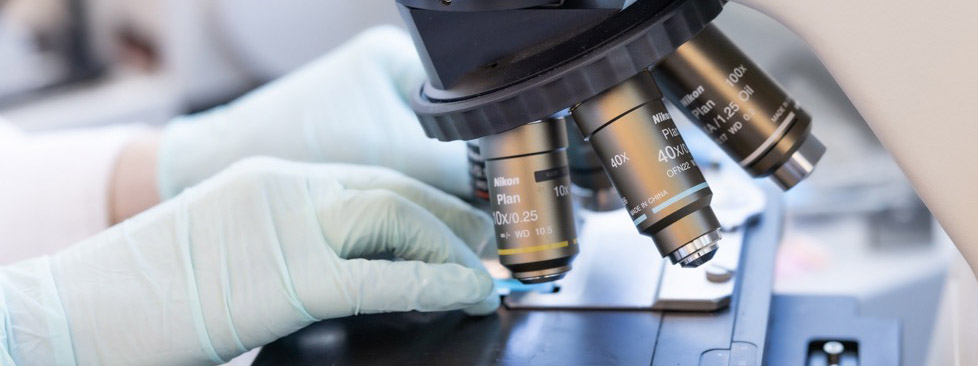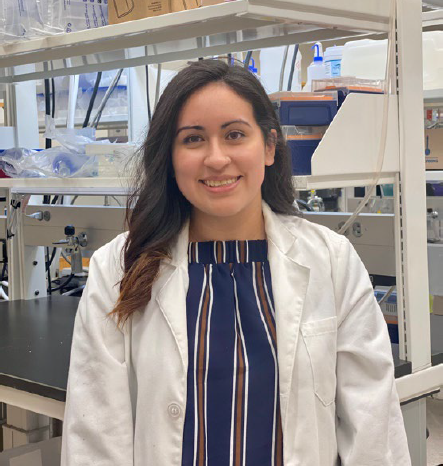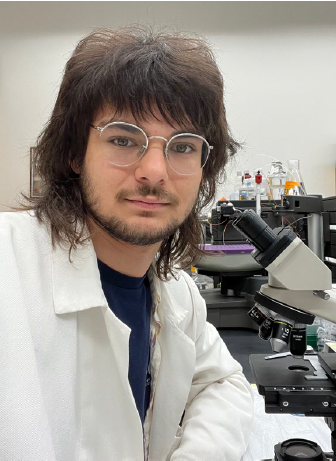Register for the NBAAD Symposium

The 2024 Neurobiology of Aging and Alzheimer’s Disease Symposium
- May 14 at 8 a.m.
- Everett Hall (RES 100)
- Breakfast and lunch will be available
- Remote viewing via Zoom available through registration
Keynote
 |
C’iana P. Cooper, PhDStaff Scientist “Memory & Cerebellum Anatomy in Aging: A Comparative Analysis” |
T32 Trainees
Calvin Brooks
 Department: Pharmacology and Neuroscience
Department: Pharmacology and Neuroscience
Graduate Program: School of Biomedical Sciences
Mentor: Raghu Krishnamoorthy
Research Interests
Neurodegeneration
Research Focus
My research focuses on the role Endothelin-1 has on retinal ganglion cell death in glaucoma. I am seeking to understand the effect that Endothelin-1 signaling has on mitophagy.
Katherine Hernandez
 Pharmacology and Neuroscience
Pharmacology and Neuroscience
Mentor: Sterling Ortega Ph.D.
Linkedin: Katherine Hernandez
Research interests
Neurobiology of Aging
Neuroimmunology
Pharmacology
Research focus
My research is focused on the neuroimmunological effects of PNU-120596 (PNU) in ischemic stroke. PNU has been shown to decrease infarct volume in rats. However, its effects on the immune system in stroke have not been researched. There are a limited number of ways to treat an ischemic stroke patient, and understanding how PNU works could provide a new clinical drug in the future to aid in ischemic stroke recovery.
Benjamin Michael Landon
 Pharmacology and Neuroscience
Pharmacology and Neuroscience
Mentor: Kunlin Jin, Ph.D.
Research Interests
Alzheimer’s Disease
Neurobiology of Aging
Neurodegeneration
Exosomes
Research Focus
Current models of Alzheimer’s Disease focus largely on the aggregating proteins amyloid-beta and hyperphosphorylated-tau, but unfortunately these targets have as of yet provided no suitable treatments for the prevention or reversal of the disease progression, and contentious benefits with regards to slowing the progression. My research aims to pursue a different potential avenue for Alzheimer’s pathology, in which small extracellular vesicles called exosomes may be responsible for transmitting the diseased phenotype from cell to cell. These vesicles carry a multitude of signaling cargos that include a variety of proteins and RNAs, which we believe could be responsible for priming a neuron for conversion to an Alzheimer’s-like phenotype, or potentially even initiating the conversion. Further exploration of exosomes and their role in Alzheimer’s Disease pathogenesis could provide new therapeutic targets for intervention in the disease process, and depending on the extent of their involvement could lead to a prolonged healthspan and/or lifespan for patients.
R. Max Petty
 Visual Sciences
Visual Sciences
North Texas Eye Research Institute
School of biomedical Sciences – Pharmacology and Neuroscience
Mentor: Raghu R. Krishnamoorthy, Ph.D.
Linkedin: R. Max Petty
Research Interests
Biochemistry and Drug Development
Nanotechnology and Targeted Drug Delivery
Ocular Neurodegeneration
Neuroprotection
Biology of Aging
Fluorescence Imaging
Research Focus
My research focuses on the encapsulation of fluorescent dyes and therapeutic agents into artificial cholesterol complexes that resemble high-density lipoproteins (HDL) as a novel drug delivery vehicle. Currently, I am focused on the delivery of neuroprotective agents to specific retinal cells for the treatment and/or prevention of ocular degeneration. With collaboration from Dr. Zygmunt Gryczynski, Ph.D. of Texas Christian University’s Physics Department, we are able to track and detect fluorescent nanoparticle biodistribution and cellular uptake inside the ocular system to determine the efficiency of drug delivery to our target tissues. By studying and understanding the movement of these drug-loaded cholesterol complexes, we are able to assess the efficacy at which our therapeutic nanoparticles are able to travel to target cells and deliver their payloads.
Rajiv Rangan
 North Texas Eye Research Institute
North Texas Eye Research Institute
Pharmacology and Neuroscience
Mentor: Tara Tovar-Vidales, Ph.D. & Abbot F. Clark, Ph.D.
ResearchGate: https://www.researchgate.net/profile/Rajiv-Rangan-2
Research Interests
Cell & Molecular Biology
Biology of Aging
Serotonergic Signaling
Neurobiology of the Visual System
Glaucoma & other Neurodegenerative Diseases
Research Focus
My research is oriented towards improving our understanding of the molecular and cellular mechanisms that contribute to the fibrotic remodeling of ocular tissues during the progression of glaucoma. In particular, my work is focused on using in vitro models of glaucomatous insults to examine how serotonin – a well-established neurotransmitter – may be acting as a pro-fibrotic signaling molecule in the delicate neural tissues of the eye, through mediating atypical protein modifications and altered protein function. This work will help establish novel molecular targets for the development of therapeutics for glaucoma, which is a major driver of irreversible vision loss globally.
Rauchelle Richey
 Physiology and Anatomy
Physiology and Anatomy
Biomedical Science- Integrative Physiology
Mentor: Steven Romero, Ph.D.
Twitter: @rerichey
Research Interest
Hypertension
Heat therapy
Cardiovascular disease
Women’s physiology
Alzheimer’s disease and related dementias
Research Focus
Cardiovascular adaptations that occur due to acute heat stress can improve vascular function in healthy older adults. My work seeks to answer whether a mild chronic heat stress (i.e., heat therapy) can provide beneficial adaptations for individuals at risk for cardiovascular disease. Specifically, my research investigates whether home-based heat therapy will improve blood pressure control and vascular function, in addition to reducing markers of Alzheimer’s disease and related dementias in post-menopausal women with treatment-resistant hypertension. This work will help to demonstrate the efficacy of heat therapy as a non-pharmacological intervention for this population.
Savanna Smith
 Integrative Physiology
Integrative Physiology
School of Biomedical Sciences-Physiology and Anatomy
Mentor: Mark Cunningham Jr., Ph.D. MBA
Linkedin: Savanna Smith
Research Interests
Maternal and Fetal Health
Mitochondrial Dysfunction
Epigenetic Regulation
Hypertension
Biology of Aging
Cognitive Decline
Research Focus
My research is focused on preeclamptic women and intrauterine growth restricted offspring (IUGR) as they age. These populations have an increased risk for hypertension and cognitive dysfunction later in life. To elucidate mechanisms underlying these outcomes, we use the reduced uterine perfusion pressure (RUPP) model in Sprague Dawley Rats to produce both the pre-eclamptic dams and IUGR pups. This is a model that has been utilized by several other labs to induce these maternal and fetal conditions. We seek to understand how long-term diseases stem from this complicated pregnancy disorder. One potential mechanism we are interested in is mitochondrial dysfunction and associated reactive oxygen species accumulation. By studying and understanding this particular mechanism, we may be able to suggest therapeutic targets to prevent these outcomes in the future.
Kumudu Subasinghe
 Department of Microbiology, Immunology & Genetics
Department of Microbiology, Immunology & Genetics
Faculty Mentor: Nicole Phillips, Ph.D.
Degree & Discipline: Genetics
LinkedIn: Kumudu Subasinghe
Research interests
Neurodegenerative diseases
Alzheimer’s Disease
Molecular mechanisms of Exosomes
Biomarker discovery
miRNA
Research focus
My primary PhD research focus is to assess the biomarker potential of Neuronal enriched exosomes (NEE) in Alzheimer’s Disease (AD) by characterizing NEE and microRNA (miRNA) in longitudinal plasma samples received from the Texas Alzheimer’s Research and Care Consortium (TARCC). AD disproportionately affects Mexican Americans (MAs) due to a combination of population-specific environmental exposures and genetic risk factors. In addition to AD, Mexican Americans have a higher prevalence of metabolic comorbidities such as type 2 diabetes (T2D) that have been implicated in accelerated age-related cognitive impairment. Evidence suggests that early alterations in the AD brain can propagate to local and distal cells through the biological packages secreted by neurons called exosomes. Exosomes are a class of small, membrane-bound extracellular vesicles that mediate cell-to-cell communication through their bioactive cargo. Selective uptake of exosomes can lead to metabolic and epigenetic reprogramming in target cells. These neuronal-enriched exosomes (NEEs) cross the blood-brain barrier and thus represent an easily accessible derivative of otherwise inaccessible brain tissue in living humans. Small, non-coding RNAs known as micro RNAs (miRNA) are transcribed from nuclear DNA and function as strong intracellular expression regulators. Transported by the exosomes, they are believed to significantly alter the expression patterns of their target cells. Although many research groups have assessed NEE-bound proteins in the context of AD, miRNA cargo and the effects of NEEs on target cells remains largely unexplored. My work aims to elucidate the biological role of NEEs in order to identify novel biomarkers and targets for the design of AD interventions and diagnostic tools that will improve patient outcomes with MA population specificity.
Amanda Tate
 Cell biology, Immunology, & Genetics
Cell biology, Immunology, & Genetics
School of Biomedical Sciences
Co-Mentors: Harlan Jones, Ph.D. & Nicole Phillips, Ph.D.
LinkedIn: Amanda Tate https://www.linkedin.com/in/amandatate-0b2997149 Research
Research interests
Cell biology
Neurobiology
Neurodegenerative diseases
Infectious disease
Epistatic interactions
Health disparities studies
Research focus
My research is investigating the epistatic interaction of APOE and ACE2 on SARSCoV- 2 and RAS dependent blood-brain barrier dysregulation. APOE is currently the strongest genetic risk factor for development of Alzheimer’s disease, and ACE2 genetic variants have been implicated in an increased risk of cardiovascular diseases, diabetes, and SARS-CoV-2 severity. We aim to investigate the interaction between these risk factors to determine the risk of a co-morbidity between COVID-19 and Alzheimer’s disease that aging populations may face in a post-pandemic world.
Olivia Young
 Pharmacology & Neuroscience
Pharmacology & Neuroscience
Mentor: Denise Inman, PhD
LinkedIn: linkedin.com/in/oliyoung
Research interests
Neurodegenerative disease
Neurobiology
Cellular metabolism
Neuropharmacology
Research focus
My research focus is surrounding the neurodegenerative diseases known as glaucoma. I use primary astrocytes from human donors to understand the relationship of these cells at the optic nerve head. I want to understand the metabolic changes that occur in response to mechanical stress and how that contributes to retinal cell death in glaucoma. I am especially interested in the endocannabinoid signaling system and the potential to modulate these pathways during cellular stress.
Register
NBAAD Symposium Registration
Register now for The 2024 Neurobiology of Aging and Alzheimer's Disease Symposium at The University of North Texas Health Science Center at Fort Worth.
Sponsors
- The Center for Healthy Aging
- CBTS Department of Pharmacology & Neuroscience
- T32 AG020494


Social media